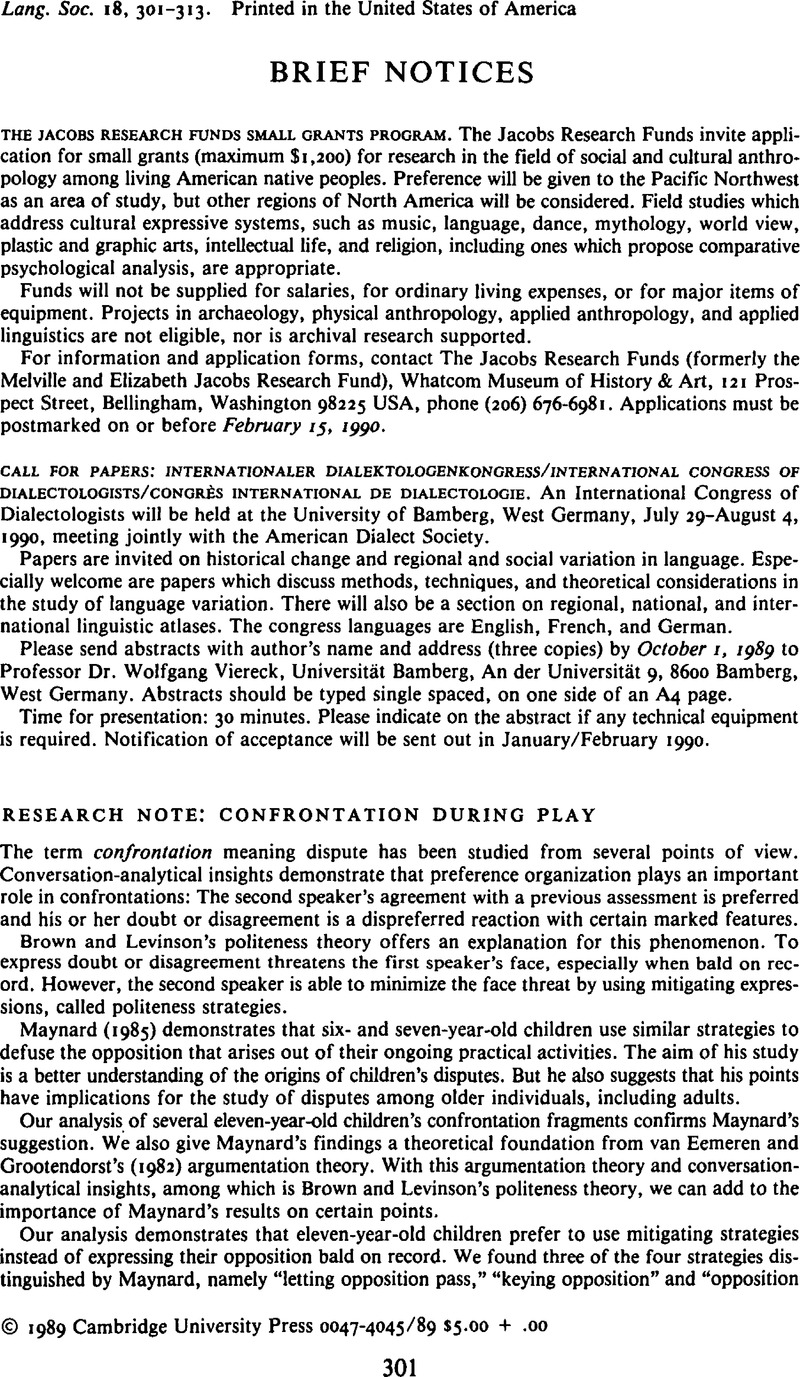No CrossRef data available.
Article contents
Brief notices/Publications received
Published online by Cambridge University Press: 18 December 2008
Abstract
An abstract is not available for this content so a preview has been provided. Please use the Get access link above for information on how to access this content.

- Type
- Brief Notices/Publications Received
- Information
- Copyright
- Copyright © Cambridge University Press 1989
References
REFERENCES
Brown, P., & Levinson, S. C. (1987). Politeness: Some universals in language usage. (Studies in Interactional Sociolinguistics, 4.) Cambridge: Cambridge University Press.CrossRefGoogle Scholar
Goodwin, M. H. (1983). Aggravated correction and disagreement in children's conversations. Journal of Pragmatics 7: 657–77.CrossRefGoogle Scholar
Maynard, D. W. (1985). How children start arguments. Language in Society 14: 1–29.CrossRefGoogle Scholar
Pomerantz, A. (1984). Agreeing and disagreeing with assessments: Some features of preferred/dispreferred turn shapes. In Atkinson, M. & Heritage, J. (eds.), Structures of social interaction. Cambridge: Cambridge University Press.Google Scholar
van Eemeren, F. H., & Grootendorst, R. (1982). Regels voor redelijke discussies. Een bijdrage tot de theoretische analyse van argumentatie ler oplossing van geschillen. Dordrecht: Foris.Google Scholar
Berman, J. (1985). Unpublished ms. Dept. of Anthropology, University of Pennsylvania, Philadelphia.Google Scholar
Hymes, D. (1981). “In vain I tried to tell you.” Philadelphia: University of Pennsylvania Press.CrossRefGoogle Scholar
Lévi-Strauss, C. ([1971] 1981). The naked mon. Chicago: University of Chicago Press. [L'Homme nu (Mythologiques, 4). Paris: Plon.]Google Scholar
Lévi-Strauss, C. ([1983] 1985). The view from afar. New York: Basic Books. [Le regard eloigné. Paris: Plon.]Google Scholar
Hymes, D. (1966). Two types of linguistic relativity. In Bright, W. (ed.), Sociolinguistics. The Hague: Mouton.Google Scholar
McCormack, W. C., & Wurm, S. A. (eds.) (1977). Language and thought: Anthropological issues. The Hague: Mouton.Google Scholar
Whorf, B. L. (1941). The relation of habitual thought and behavior to language. In Spier, L., Hallowell, A. I., & Newman, S. S. (eds.), Language, culture, and personality: Essays in memory of Edward Sapir. Menasha: Banta. [Also in J. B. Carroll (ed.), Language, thought, and reality: Selected writings of Benjamin Lee Whorf. New York: John Wiley, 1956; Cambridge: The Technology Press.]Google Scholar


